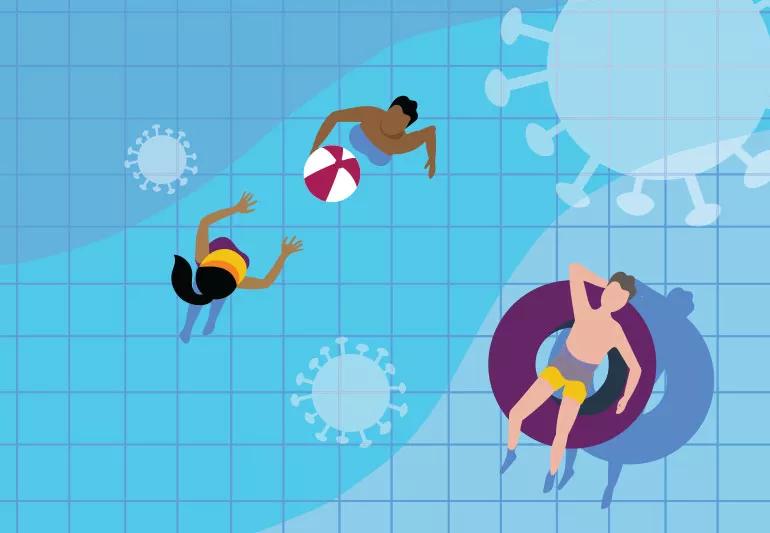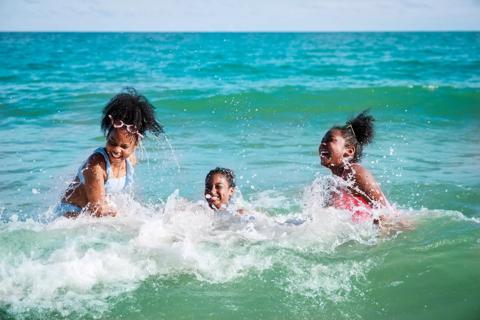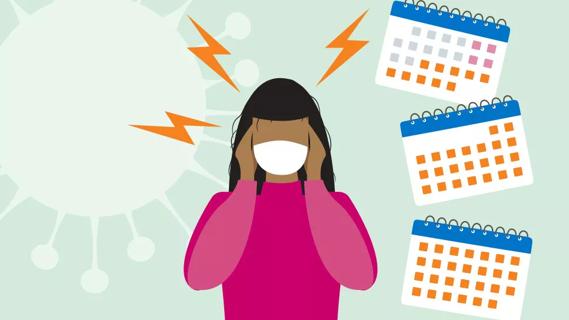Experts share pool safety tips as the contagious delta variant surges

When the weather’s warm, there’s nothing more refreshing than visiting an outdoor pool and taking a leisurely dip in the water. During chillier months, swimming laps indoors doubles as great exercise, in addition to being relaxing.
Cleveland Clinic is a non-profit academic medical center. Advertising on our site helps support our mission. We do not endorse non-Cleveland Clinic products or services. Policy
The pool itself was considered a relatively safe place to be during the initial waves of the COVID-19 pandemic. But is the more contagious delta variant changing the equation? Pulmonary and critical care physician Joseph Khabbaza, MD, gives an update on swimming safety during COVID-19.
The COVID-19 delta variant is more contagious and transmissible. “The thing with the delta variant is it seems that you need less close, sustained contact to get infected than before,” says Dr. Khabbaza. “Before, we thought it was 10 or 15 minutes of close, sustained contact — but it’s quite a bit shorter with delta, just because there’s so much more virus an infected person produces, and it seems the virus attaches much stronger to our upper airways.”
That’s one major reason vaccination is so important, Dr. Khabbaza adds. “If you’re vaccinated, all these concerns are going to be exponentially less than in an unvaccinated person. Being unvaccinated is the riskiest move right now,” he says. “Even long before we had delta, to go around with no immunity to COVID is pretty high risk in the middle of a pandemic.”
Additionally, while the health benefits of working out are undeniable, where you exercise could make a difference. “Across the board, outdoor activities are going to be safer than indoor activities, especially now that there are more contagious variants,” Dr. Khabbaza says. “With the delta variant, you’re making a lot more viral copies in your nose and mouth. It takes a lot less exposure and close contact to somebody else to transmit it.”
Knowing your environment — and knowing who you’ll be around — can help you assess risks. “If you’re going to a community rec center, you can factor in local rates of infection and vaccination rates to have a general feel of the perceived risk,” says Dr. Khabbaza. “Ultimately, the virus is spread via person to person transmission via respiratory droplets, or aerosol droplets. The main thing is just avoiding close, sustained contact with people you don’t know. That is going to be the main way to avoid it, as it has been throughout the pandemic.”
Simply jumping in the pool to cool off or get some exercise is safe. “The virus is not waterborne,” says Dr. Khabbaza. “In general, the virus doesn’t live in water, so it’s not going to spread very well in water.”
It follows that outdoor pools are better options than indoor ones — a great option during warmer months, although sadly not feasible when the snow’s falling. However, as with land-based activities, how much you do (or don’t) keep your distance from other people can make a difference. That means the size of pools matters — bigger ones with space to spread out offer fewer risks — as does the environment.
Dr. Khabbaza notes if you’re hanging out shoulder-to-shoulder in an outdoor pool, listening to music and chilling with friends, “that setting is not too different than indoor events” might be. “If it’s very crowded or it’s a smaller pool, and there’s lots of singing and laughter, those are things that cause more respiratory droplets and aerosols.”
Being in motion also makes a difference for transmission. “When swimming for exercise and for fun, you’re always moving,” Dr. Khabbaza says. “You’re not in close, sustained contact with others. It’s going to be pretty low-risk because you’re just passing by.” He likens it to the grocery store, where you’re just passing by people in the aisles. “It’s a little different than the lanes in a pool, where you’re probably breathing heavier, but in passing, it’s very hard to really transmit much — short of, if you stop together and are face-to-face talking for a bit in the pool.”
Distance and masking are easy safety precautions to take outside of the water, although you shouldn’t wear a mask in the pool, because you wouldn’t be able to breathe once it gets wet. “But anything else around the pool, whether it’s concessions or locker rooms, distance from people and then wearing a mask in those settings is going to give you that extra layer of protection,” says Dr. Khabbaza. “You’ll never regret being too cautious, especially when it allows you to have some leisure that you’ve missed out on the past year and a half or so.”
Many outdoor and indoor pools have mask requirements on pool decks, although where possible patrons should also distance. “A mask alone is not perfect, but it’s good,” says Dr. Khabbaza. “And then distance plus a mask is going to be better. Distance and a mask, plus vaccination — they’re just ways to make it harder for a virus to get to you. Each layer you put on is just going to minimize the risk further. However, the most important layer is being vaccinated. If you’re vaccinated, anything you do is going to be so much safer across the board.”
Even still, one thing you don’t necessarily have to be overly concerned about is getting COVID-19 via touch. “Thankfully, we’re seeing that a lot of these deep cleaning and surface contact point cleanings are probably not as high yield as maybe we initially thought early in the pandemic. We previously thought there was a lot more of contact transmission, where you’ve touched the contaminated surface, and then touched your eyes, nose or mouth,” says Dr. Khabbaza. “That certainly could be a way of transmission, but a lot of scenarios have to go down for that to be a way that you get infected.”
Disinfection levels in the pool itself are key, says Diane Weaver, aquatics manager at Cleveland Clinic Akron General LifeStyles – Stow. “When we look at our chemical levels, we look at a lot of different things. Chlorine and pH work together to maintain disinfection and make sure that you don’t feel itchy when you get out of the pool.” Proper levels of pH are also important for healthy skin, she adds. “When you get into the pool, your body should feel like it’s at its normal state.”
Don’t be afraid to ask what disinfection looks like at your pool either. “You should feel comfortable asking the lifeguard or management staff, ‘What is your chlorine level?’ or ‘What type of disinfection is used in the pool?’” Weaver says. “I would say probably 95% of the pools around here use chlorine.”
Weaver says chlorine levels since the COVID-19 pandemic began are set to at least three parts per million. Even in non-pandemic times, however, chlorine levels need to be maintained at least two parts per million. “If they’re under two parts per million, I would not swim there,” she says. “I would also encourage people to have a set of their own equipment, instead of borrowing. That would be like, your goggles, anything that you use for lap swimming — your fins, flippers. The less shared equipment, the better. I would also be asking, ‘What does your facility do to disinfect things in between users?’”
That’s a natural question to ask. But right now, there’s no scientifically-based answer to this question. Pools need to use chlorine for sanitation reasons unrelated to COVID-19. Since no data exists to support or refute this idea, pool safety has been focused on what safety measures pools can take.
As the pandemic emerged in 2020, Weaver says the Stow LifeStyles facility focused on keeping pools, locker rooms and common areas safe for patrons. They installed multiple sanitizing stations along the pathway from the entrance to the pool itself and also minimized touch points. Staff typed in membership codes for visitors and propped open doors so members didn’t have to touch handles. The facility also encouraged members to bring their own swimming gear, and temporarily didn’t offer equipment that would be difficult to sanitize, such as flippers or styrofoam pool buoys.
Weaver says the facility also installed measures to encourage distancing. They blocked off lockers in locker rooms so people weren’t next to each other, and each swimmer had a chair at the end of their lap lane, which they could use for changing or resting. Swimmers were also encouraged not to congregate and chat at the end of lap lanes. Meanwhile, lifeguards had their own individual sets of rescue gear.
“We reopened knowing what we were going to be getting ourselves into and knowing that we would have a lot of people who were afraid to come back,” Weaver says. “But we were also willing to change if we needed to. And we were willing to listen to the concerns of our members.”
Overall, Dr. Khabbaza says considering pool and swimming safety comes back to your own personal level of risk tolerance. “If you know you’re going to be nervous and wondering if an infection was transmitted after you’ve been around people you don’t know for a period of time, you probably should be avoiding settings like that,” he says. “And if it ends up you show up somewhere and it just doesn’t feel right, or it feels like, ‘Wow, maybe there are too many people here,’ go home, or leave or find something else to do. If any setting or situation doesn’t feel right, do not force yourself to stay in it.”
If that’s not feasible, then being cautious is perfectly fine. “In any setting where you feel uncomfortable, you can still wear a mask or eye protection,” Dr. Khabbaza says. “You can still take extra precautions. I tell everyone that you’ll never regret being too cautious during a pandemic.”
Learn more about our editorial process.

COVID-19 may be associated with tinnitus, but research is still ongoing

Sea lice aren’t really lice, but these tiny creatures can trigger an unpleasant allergic reaction

The short answer: It’s complicated, but the basic care precautions still prevail, like washing your hands and isolating if you’re sick

They can feel like a typical headache or a migraine headache, but the pain can last for weeks to months

Any large social gathering — from a family birthday party to an indoor music concert — has the potential to spread serious infection

It’s important to connect with a healthcare provider, get quality sleep and balance your activities with your energy levels

Symptoms can overlap and be hard to distinguish, but there are some telltale differences

Just like the flu, COVID-19 will continue to evolve every year

Your metabolism may torch 1,300 to 2,000 calories daily with no activity

A gentle touch in all the right places may help drain your sinuses